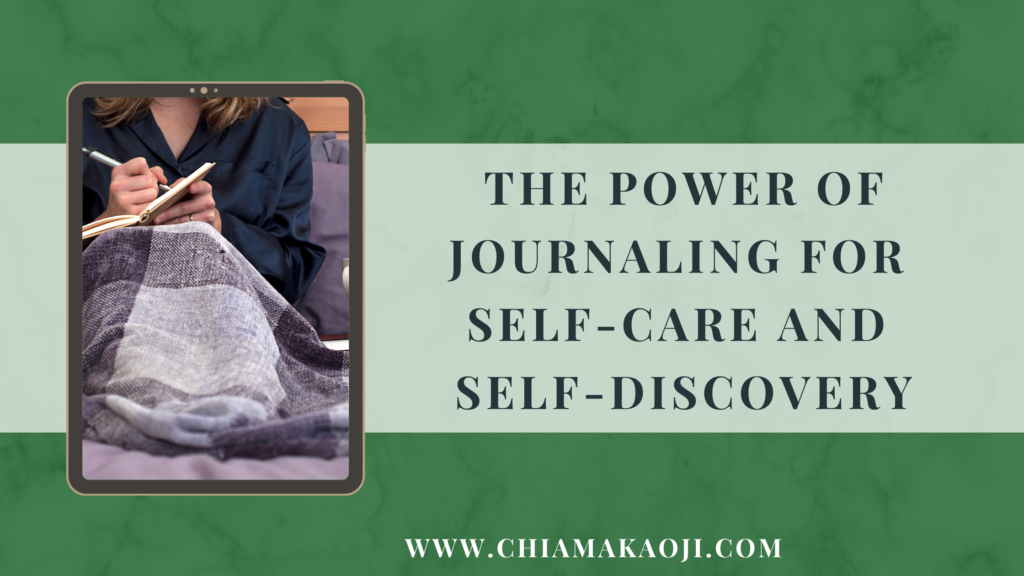Are you looking for a simple yet powerful tool for self-care and self-discovery?
Something that can help you reduce stress, improve your mood, and gain clarity on your thoughts and emotions? Look no further than journaling. Journaling is a simple practice of writing down your thoughts and feelings in a notebook or journal.
It’s a versatile tool that can be used for a variety of purposes, from processing emotions to setting goals to creative expression. In this article, we’ll explore the power of journaling for self-care and self-discovery, and provide practical tips on how to get started.
The benefits of journaling
Journaling has been shown to have numerous benefits for mental and emotional well-being. Research has found that journaling can help reduce stress, improve mood, enhance self-awareness, and boost creativity. By writing down your thoughts and feelings, you can gain insight into your patterns of thinking and behavior, identify triggers for stress and negative emotions, and develop a more positive outlook on life.
Different types of journaling
There are many types of journaling, and the type you choose depends on your goals and preferences. Some popular types of journaling include:
- Reflection journaling: This involves reflecting on your day or week, identifying what went well and what could be improved, and setting goals for the future.
- Gratitude journaling: This involves writing down things you are grateful for, which can help shift your focus from negative to positive emotions.
- Creative journaling: This involves using your journal for creative expressions, such as drawing, painting, or writing poetry.
- Stream-of-consciousness journaling: This involves writing down whatever comes to mind, without judgment or censorship, which can help clear your mind and reduce stress.
How to get started with journaling
If you’re new to journaling, getting started can be daunting. Here are some tips to help you get started:
- Choose a journal or notebook that you like and that feels comfortable to write in.
- Set aside a specific time each day or week for journaling, and make it a regular habit.
- Choose a type of journaling that resonates with you and your goals.
- Write freely and without judgment or censorship. Remember, no one else has to read what you write.
- Use prompts or questions to help get your thoughts flowing, such as “What am I grateful for today?” or “What is causing me stress right now?”
- Experiment with different types of journaling to find what works best for you.
Journaling for self-care
Journaling is a powerful tool for self-care. By taking the time to reflect on your thoughts and emotions, you can gain insight into your needs and values, and identify areas of your life that need attention. Here are some ways to use journaling for self-care:
- Write down your goals and aspirations, and break them down into actionable steps.
- Identify activities or behaviours that bring you joy or peace, and make time for them regularly.
- Write down affirmations or positive self-talk to counter negative self-talk.
- Track your mood or energy levels to identify patterns and triggers for stress or anxiety.
- Use your journal to process difficult emotions or experiences, and seek support from a therapist or trusted friend when needed.
Journaling for self-discovery
Journaling is also a powerful tool for self-discovery. By writing down your thoughts and feelings, you can gain insight into your beliefs, values, and patterns of behaviour. Here are some ways to use journaling for self-discovery:
- Write down your core values and beliefs, and reflect on how they guide your decisions and actions.
- Identify areas of your life where you feel stuck or uncertain, and use your journal to explore these feelings in more depth. Ask yourself questions like “What am I afraid of?” or “What’s holding me back?” Write about your dreams and aspirations, and reflect on what steps you can take to make them a reality. Track your progress on personal goals, and celebrate your successes along the way.
- Use your journal to reflect on challenging experiences or situations, and explore how you can grow and learn from them.
Journaling can be a valuable tool for self-discovery, but it’s important to approach it with an open mind and a willingness to explore your thoughts and feelings. Don’t be afraid to ask yourself tough questions or to delve into difficult emotions. With practice, you’ll develop a deeper understanding of yourself and the world around you.
Remember, journaling is a personal practice, so there’s no right or wrong way to do it. Experiment with different techniques and find what works best for you.
The most important thing is to be honest with yourself and use your journal as a tool for self-reflection and growth.
And, as always, stay tuned for more tips and advice on healthy living on this website.
